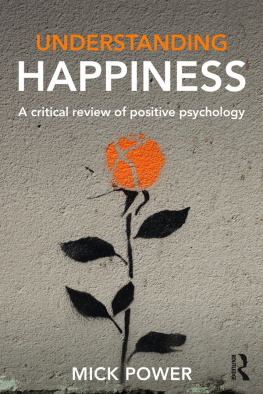SAGE Publications Ltd
1 Olivers Yard
55 City Road
London EC1Y 1SP
SAGE Publications Inc.
2455 Teller Road
Thousand Oaks, California 91320
SAGE Publications India Pvt Ltd
B 1/I 1 Mohan Cooperative Industrial Area
Mathura Road
New Delhi 110 044
SAGE Publications Asia-Pacific Pte Ltd
3 Church Street
#10-04 Samsung Hub
Singapore 049483
John M. Zelenski 2020
First published 2020
Apart from any fair dealing for the purposes of research or private study, or criticism or review, as permitted under the Copyright, Designs and Patents Act, 1988, this publication may be reproduced, stored or transmitted in any form, or by any means, only with the prior permission in writing of the publishers, or in the case of reprographic reproduction, in accordance with the terms of licences issued by the Copyright Licensing Agency. Enquiries concerning reproduction outside those terms should be sent to the publishers.
Library of Congress Control Number: 2019943574
British Library Cataloguing in Publication data
A catalogue record for this book is available from the British Library
ISBN 978-1-4739-0214-5
ISBN 978-1-4739-0215-2 (pbk)
Editor: Robert Patterson
Assistant editor: Katie Rabot
Production editor: Imogen Roome
Copyeditor: Neil Dowden
Proofreader: Leigh C. Smithson
Indexer: Silvia Benvenuto
Marketing manager: Tamara Navaratnam
Cover design: Wendy Scott
Typeset by: C&M Digitals (P) Ltd, Chennai, India
Printed in the UK
At SAGE we take sustainability seriously. Most of our products are printed in the UK using responsibly sourced papers and boards. When we print overseas we ensure sustainable papers are used as measured by the PREPS grading system. We undertake an annual audit to monitor our sustainability.
About the Author
John Zelenskiis a Professor of Psychology at Carleton University in Ottawa, Canada. As a researcher and director of the Carleton University Happiness Laboratory, he studies individual differences in happiness, and how personality manifests itself in the moment as emotional, behavioural, and cognitive processes. His recent work has focused on two areas: the causes and consequences of social behaviour (e.g. in relation to the personality trait of introversionextraversion), and the links among nature, peoples sense of connection to nature (nature relatedness), happiness, and environmentally sustainable behaviour. He has also taught a range of personality, methods, and positive psychology courses at Carleton and around the world with Semester at Sea.
Acknowledgements
I am grateful to many: my teachers, mentors, colleagues, and students, to the team at SAGE, and to family and friends who have provided encouragement for this book and shaped my thinking about positive psychology. In particular, Cheryl Harasymchuk, Katie Gunnell, Chris Davis, Zack van Allen, and Eve-Marie Blouin-Hudon have generously and skilfully provided assistance and feedback on this project.
How to Use This Book
Chapter Introductions and Conclusions
Each chapter contains an introduction to introduce you to the area under discussion and a conclusion that summarizes the key information to take away.
In Focus
The In Focus sections highlight cutting-edge and interesting research developments to provide you with emerging insights and controversies that arise from constantly evolving areas of research.
Research Case
The Research Case sections look at a specific piece of research, key studies, or theory in closer detail to help you understand the links between study methods and conclusions.
Try It
The Try It sections have various questionnairres or exercises for you to try out theories and practices for yourself!
Test Yourself
The Test Yourself sections contain questions that are designed to test your understanding as you progress through each chapter.
Web Links
There are Web Links at the end of each chapter to point you in the right direction when you would like to know more about a given topic.
Further Reading
Each chapter has collated a range of articles and books for you to read if you wish to explore this area further.
Online Resources
A newly introduced key phrase or piece of terminology will be emboldened throughout the text. For a more detailed definition of these phrases please visit https://study.sagepub.com/positivepsychology to view the glossary. You will also find instructor questions and student MCQs for further learning.
Part I Introduction
Describing the Science of Positive Psychology
Introduction
Imagine you wake up to a new day, have a small breakfast, and then open your web browser to see the headline Government begins adjusting tax policy to maximize happiness. How would you react? Whether its along the lines of Impossible theyll have no money or more Its about time!, that headline is becoming increasingly likely. Leaving aside the specifics of tax policy, many countries governments now want to measure citizens happiness. They are working with social scientists to develop national indicators of well-being, and a core component of these measurements will involve asking people how happy they feel.
For example, in 2010 UK Prime Minister David Cameron announced that government would begin measuring the happiness of its citizens (Stratton, 2010). The idea is that this would provide a useful tool in developing government policy. With these data, the UK Office for National Statistics noted a small increase in happiness over 2013, and some suggested that hosting the Olympics in London might have contributed to this (BBC News, 2013). The UKs happiness index is similar to Bhutans long popularized measure of gross national happiness (see Musikanski, 2014). Such measures are often justified by contrasting them with economic indicators. Governments have long relied on economic data to make decisions. As one example of an economic indicator, gross domestic product is the full sum of a countrys economic activity. It is carefully assessed, and its changes are frequently reported in the media. However, as American Robert Kennedy (1968) articulated in a moving speech at the University of Kansas, it measures everything except that which makes life worth living. It

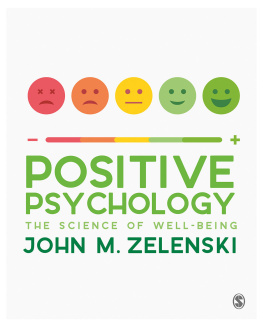
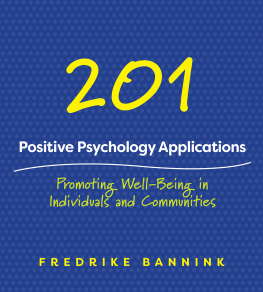
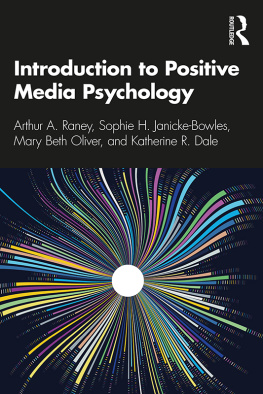
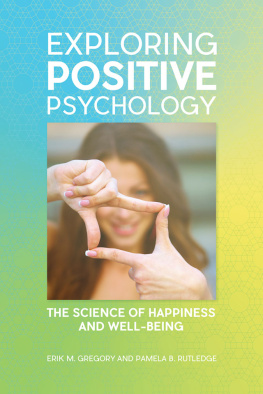


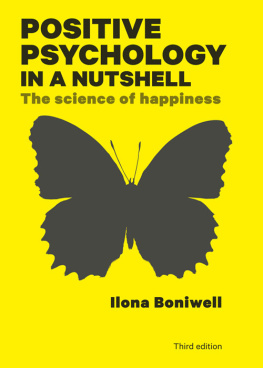


![Sarah Lewis [Sarah Lewis] - Positive Psychology and Change](/uploads/posts/book/124055/thumbs/sarah-lewis-sarah-lewis-positive-psychology-and.jpg)


